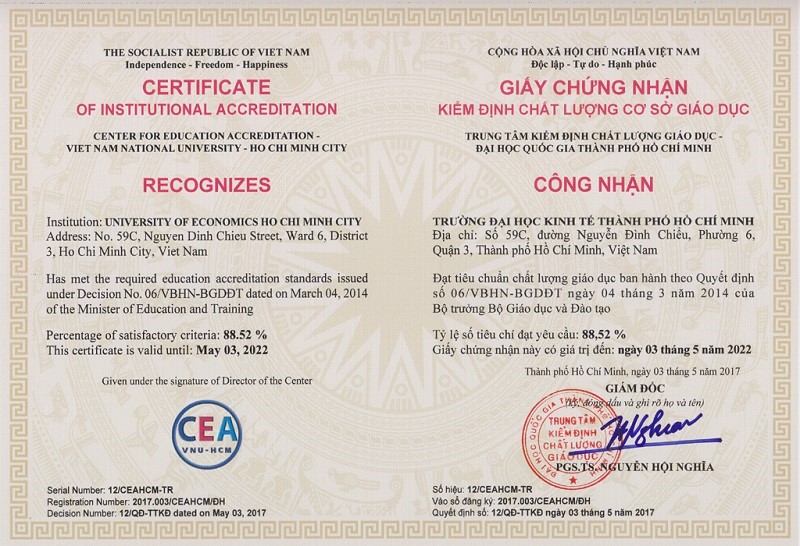
UEH achieves 88.52% of education quality standards inaccordance with the standards set by Ministry of Education and Training
Self-assessment at Universities is a regular task performed by Universities around the world, especially in developed countries. Self-assessment report is the result of a process of University’s self-review and research in accordance with the educational quality assessment standards issued by the Ministry of Education and Training to report regarding the following issues: the status of education quality, effectiveness of training activities, scientific research, human resources, facilities, as well as other related issues. From this foundation, this University can adjust resources and implementation process to meet quality standards in terms of education major.
University of Economics Ho Chi Minh City has carried out the primary education quality accreditation cycle 1 in 2009 and was recognized by the external assessment mission as a level 2 standard educational institution (the quality level is higher than the requested standard). After 5 years of implementing the improvement plans set out in cycle 1 to improve the educational quality of the school, UEH University continues to conduct self-assessment of the quality of education and training activities in order to help UEH to self-review, to review and to evaluate their own situation after implementing improvement plans from cycle 1, making and implementing action plans to improve and boost training quality. From this foundation, UEH University can adjust the goals for the next period in accordance with UEH University’s strategic direction. In addition, UEH University’s self-assessment report is the foundation for external assessment agencies to conduct accreditation for self-affirmation and to be recognized as meeting Vietnamese university quality standards (in accordance with the Ministry of Education and Training’s set of criteria for University quality accreditation). In accordance with this foundation, UEH University continues to carry out the self-assessment report cycle 2 (the 2009-2014 period).
After completing UEH self-assessment report cycle 2 (period 2009-2014), Ho Chi Minh City University of Economics (UEH) continues to register for the quality accreditation of grassroots education at Center of Education Quality Accreditation - Vietnam National University Ho Chi Minh City in 2016.
In December 2016, University of Economics Ho Chi Minh City (UEH) conducted a self-assessment of the quality of educational activities at the grassroots level in the 2nd cycle of the 2011-2016 period in accordance with the set of quality standards issued by the Ministry of Education and Training as well as Center of Education Quality Accreditation - Vietnam National University, Ho Chi Minh City came to assess the quality of education at UEH University level (with the rate: 88.52%), valid until May 3, 2022.

Certificate of Educational Quality Accreditation for University of Economics Ho Chi Minh City
Introduction of the higher education quality accreditation standards set by the Ministry of Education and Training:
On May 23, 2013, the Department of Educational Testing and Accreditation issued Official Letter No. 527/KTKDCLGD-KĐĐH guiding the use of educational quality assessment criteria at educational institutions for Universities to use in self-assessment since 2013. The new set of standards for assessing the quality of higher education was issued on November 1, 2007 by the Minister of Education and Training (compared with that of the Ministry of Education and Training, the 2004 old set of standards). The new set of standards did not set achievement levels like the old one (for example: goals were not achieved in advance so that schools would self-assess how far they had achieved; therefore, it would avoid a situation of confrontation or trying to create evidence for the school to achieve a high level). This new set of standards has set forth clearer and more specific criteria and is always linked to the University’s charter, the University’s mission and research direction. This new set of standards for assessing the quality of higher education includes 10 standards - 61 criteria (replacing the old set of 10 standards - 53 criteria), in which some standards have added additional criteria, some of the old criteria have been split or merged to make the criteria more specific.
- Standard 1: Mission and goals of the University
- Standard 2: Organization and management
- Standard 3: Educational Program
- Standard 4: Training activities
- Standard 5: Management staff, lecturers and staff
- Standard 6: Learners
- Standard 7: Scientific research, application, development and technology transfer
- Standard 8: International cooperation activities
- Standard 9: Library, learning equipment and other facilities
- Standard 10: Finance and financial management
![]()
Criteria for Accreditation at the Education Institution Level issued by the Ministry of Education and Training:
On May 19, 2017, the Ministry of Education and Training issued Circular No. 12/2017/TT-BGDDT promulgating the Regulations on standards for assessing the quality of higher education for Universities to use in the field of higher education self-assessment since 2017. This Circular replaces the previous documents stipulating the standards for assessing the quality of higher education, the process and the cycle of education quality accreditation for colleges, universities, academies.
The new set of higher education quality assessment standards has been promulgated on the basis of asymptotes with the AUN-QA educational quality assessment standards.
The new set of standards did not set the Pass or Fail levels as the old one did (for example: the fact that it did not set goals in advance so that schools would self-assess how far they had achieved will avoid the situation of coping or trying to create evidence for the school to achieve a high level). Nevertheless, using a 7-point scale to evaluate similar to AUN-QA. This new set of standards has set forth clearer, more specific criteria and is always linked to the University’s charter, the University’s mission and research direction, and requires continuous quality improvement in each standard. This new set of standards for assessing the quality of higher education includes 25 standards - 111 criteria (replacing the old set of standards 10 standards - 61 criteria), in which some standards have added criteria, some of the old criteria have been split or merged to make the criteria more specific.
Contents of standards:
|
NO. |
Majors/ Standards/Criteria |
|---|---|
|
I |
Area 1. Quality assurance on strategy (8 standards, 37 criteria) |
|
I.1 |
Standard 1. Vision, mission and culture (05 criteria) |
|
I.2 |
Standard 2. Governance (04 criteria) |
|
I.3 |
Standard 3. Leadership and management (04 criteria) |
|
I.4 |
Standard 4. Strategy Management (04 criteria) |
|
I.5 |
Standard 5. Policies on training, scientific research and community service (04 criteria) |
|
I.6 |
Standard 6. Human resource management (07 criteria) |
|
I.7 |
Standard 7. Financial and facilities management (05 criteria) |
|
I.8 |
Standard 8. External networks and relations (04 criteria) |
|
II |
Area 2. Quality assurance on the system (4 standards, 19 criteria) |
|
II.9 |
Standard 9. Internal quality assurance system (06 criteria) |
|
II.10 |
Standard 10. Self-assessment and external assessment (04 criteria) |
|
II.11 |
Standard 11. Internal quality assurance information system (04 criteria) |
|
II.12 |
Standard 12. Quality improvement (05 criteria) |
|
III |
Area 3. Quality assurance on the performance of functions (9 standards, 39 criteria) |
|
III.13 |
Standard 13. Enrollment and admission (05 criteria) |
|
III.14 |
Standard 14. Curriculum design and review (05 criteria) |
|
III.15 |
Standard 15. Teaching and learning (05 criteria) |
|
III.16 |
Standard 16. Evaluation of learners (04 criteria) |
|
III.17 |
Standard 17. Activities to serve and support learners (04 criteria) |
|
III.18 |
Standard 18. Scientific research management (04 criteria) |
|
III.19 |
Standard 19. Intellectual property management (04 criteria) |
|
III.20 |
Standard 20. Scientific research cooperation and partners (04 criteria) |
|
III.21 |
Standard 21. Connecting and serving the community (04 criteria) |
|
IV |
Area 4. Performance outcomes (4 standards, 16 criteria) |
|
IV.22 |
Standard 22. Training outcomes (04 criteria) |
|
IV.23 |
Standard 23. Scientific research outcomes (06 criteria) |
|
IV.24 |
Standard 24. Community service outcomes (04 criteria) |
|
IV.25 |
Standard 25. Financial and market outcomes (02 criteria) |
